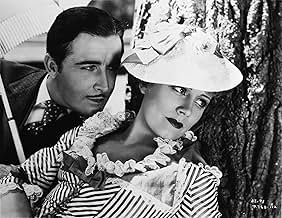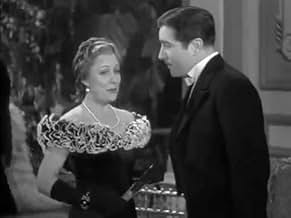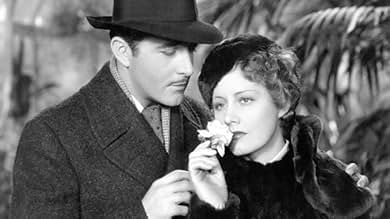CALIFICACIÓN DE IMDb
6.2/10
564
TU CALIFICACIÓN
Agrega una trama en tu idiomaAn engaged attorney and a divorcee fall for each other in 1870s Manhattan.An engaged attorney and a divorcee fall for each other in 1870s Manhattan.An engaged attorney and a divorcee fall for each other in 1870s Manhattan.
- Dirección
- Guionistas
- Elenco
- Premios
- 3 premios ganados en total
Barry O'Moore
- Mr. Welland
- (as Herbert Yost)
Lowden Adams
- Jenkins
- (sin créditos)
Muriel Barr
- Miss Allison - Jenkins' Daughter
- (sin créditos)
Harry Beresford
- Museum Guard
- (sin créditos)
Lynn Browning
- Miss Archer
- (sin créditos)
Herbert Bunston
- W.J. Letterblair
- (sin créditos)
Bess Flowers
- Child's Mother
- (sin créditos)
Alf James
- Man Who Comes with Chairs
- (sin créditos)
John Merton
- John
- (sin créditos)
Opiniones destacadas
Technically speaking, this is a generally well made film. The acting (apart from some serious over-melodramatic acting from John Boles) was good and the entire production looked marvelous. So why, then, only a score of 5? Well, the story seems to try hard to make an excellent point--only to have it undone by plot holes that just don't make a lot of sense. Perhaps in the original Edith Wharton novel this is not the case, but here the film seems to be missing something.
The film begins with Boles ("Newland Archer") becoming engaged with his long time sweetheart, May. They seem like a happy couple and they are going into the upcoming marriage with not a care in the world other than wanting to marry sooner than later. At about the same time, May's cousin (Countess Ellen Olenska--played by Irene Dunne) is arriving from Europe and there is a great scandal because Mrs. Olenska is planning on divorcing her husband--something that polite society at the time would NEVER condone. It is interesting that we never see her husband nor do we really know much about their marriage other than the fact that she is unhappy and wants out--even though her family is strongly in favor of her remaining married. The family's wishes, oddly, are NOT because of a love for Olenska but because they were more concerned about how the scandal would ruin their good name! Many, in fact, were totally unconcerned about her soon to be ex-husband nor about adultery--just what others would think. This hypocrisy made for an excellent theme and I wish the film had really worked more on this angle.
Unfortunately, out of the blue, Archer suddenly announces to the Countess that he loves her!! Where this comes from makes no sense at all--especially since his bride to be is a sweet lady who has done no one wrong. Yet despite this profession, Archer still marries May and they go on their honeymoon. During this time, Archer is distant and quite frankly a major jerk--pining for the Countess and ignoring his poor wife. Frankly, any sympathy you had for the Countess and her divorce is quickly lost because she, too, is conspiring with Archer to run away together. So instead of an excellent story of hypocrisy, the story becomes a story of lust and selfishness--making the viewer really hate Boles and Dunne (especially Boles). All the great buildup of the last hour of the film is practically thrown away when this affair appears out of nowhere.
So what, at this point, is the point of the film? This ambiguity was a serious deficiency with the film. Had Archer never married May and then run off with the Countess, then you might have had a lot of sympathy for the couple. As is, they just seemed nasty and selfish. And the overall message seemed muddled. Were they trying to excuse away adultery or somehow trying to be pro-marriage? I really don't know. Had Archer acted rationally and consistently and less like a weasel, then this message would have been much more clear. As a result, it seriously deadens the impact of this film. It COULD have been much, much better.
The film begins with Boles ("Newland Archer") becoming engaged with his long time sweetheart, May. They seem like a happy couple and they are going into the upcoming marriage with not a care in the world other than wanting to marry sooner than later. At about the same time, May's cousin (Countess Ellen Olenska--played by Irene Dunne) is arriving from Europe and there is a great scandal because Mrs. Olenska is planning on divorcing her husband--something that polite society at the time would NEVER condone. It is interesting that we never see her husband nor do we really know much about their marriage other than the fact that she is unhappy and wants out--even though her family is strongly in favor of her remaining married. The family's wishes, oddly, are NOT because of a love for Olenska but because they were more concerned about how the scandal would ruin their good name! Many, in fact, were totally unconcerned about her soon to be ex-husband nor about adultery--just what others would think. This hypocrisy made for an excellent theme and I wish the film had really worked more on this angle.
Unfortunately, out of the blue, Archer suddenly announces to the Countess that he loves her!! Where this comes from makes no sense at all--especially since his bride to be is a sweet lady who has done no one wrong. Yet despite this profession, Archer still marries May and they go on their honeymoon. During this time, Archer is distant and quite frankly a major jerk--pining for the Countess and ignoring his poor wife. Frankly, any sympathy you had for the Countess and her divorce is quickly lost because she, too, is conspiring with Archer to run away together. So instead of an excellent story of hypocrisy, the story becomes a story of lust and selfishness--making the viewer really hate Boles and Dunne (especially Boles). All the great buildup of the last hour of the film is practically thrown away when this affair appears out of nowhere.
So what, at this point, is the point of the film? This ambiguity was a serious deficiency with the film. Had Archer never married May and then run off with the Countess, then you might have had a lot of sympathy for the couple. As is, they just seemed nasty and selfish. And the overall message seemed muddled. Were they trying to excuse away adultery or somehow trying to be pro-marriage? I really don't know. Had Archer acted rationally and consistently and less like a weasel, then this message would have been much more clear. As a result, it seriously deadens the impact of this film. It COULD have been much, much better.
This "Age of Innocence" from 1934, of course, cannot even approach the sumptuous beauty.amazing acting, and rich story-telling of the Martin Scorsese "Age of Innocence" from 1993 starring Daniel Day-Lewis, Winona Ryder, and Michelle Pfeiffer.
The 1934 movie stars Irene Dunne as Ellen, John Boles as Newland, and Julie Haydon as May.
The story is told in flashback by the elderly Newland. As a young attorney in the late 1800s, he was engaged to May when her cousin Ellen came to visit from Europe. She plans to divorce her husband and is a social outcast, as these things were never done. Newland and Ellen fall in love. Do they defy convention and marry? Or does Newland marry May as promised?
Irene Dunne is lovely as Ellen. She was an actress who could do comedy and drama. John Boles was a huge star and not a tremendous actor. That kind of look was considered attractive way back when; today it has gone out of style.
There are good performances, but there is no way to watch this film after seeing the Scorsese film. It is studio-made, looks dull, and is dull. This is a story with a great deal of depth that seems untouched here -- lots going on underneath all the gentility, the trap of conventions -- here told as an ordinary story.
Helen Westley is wonderful as the cousins' grandmother, as is Laura Hope Crews as Dunne's aunt and May's mother. Lionel Atwill is also on hand as a married man who is a friend of Dunne's, an unacceptable situation.
The novel was also adapted into a play, on Broadway starring Katherine Cornell as Ellen and Franchot Tone as Newland.
If you haven't seen the stunning Scorsese film, see it.
The 1934 movie stars Irene Dunne as Ellen, John Boles as Newland, and Julie Haydon as May.
The story is told in flashback by the elderly Newland. As a young attorney in the late 1800s, he was engaged to May when her cousin Ellen came to visit from Europe. She plans to divorce her husband and is a social outcast, as these things were never done. Newland and Ellen fall in love. Do they defy convention and marry? Or does Newland marry May as promised?
Irene Dunne is lovely as Ellen. She was an actress who could do comedy and drama. John Boles was a huge star and not a tremendous actor. That kind of look was considered attractive way back when; today it has gone out of style.
There are good performances, but there is no way to watch this film after seeing the Scorsese film. It is studio-made, looks dull, and is dull. This is a story with a great deal of depth that seems untouched here -- lots going on underneath all the gentility, the trap of conventions -- here told as an ordinary story.
Helen Westley is wonderful as the cousins' grandmother, as is Laura Hope Crews as Dunne's aunt and May's mother. Lionel Atwill is also on hand as a married man who is a friend of Dunne's, an unacceptable situation.
The novel was also adapted into a play, on Broadway starring Katherine Cornell as Ellen and Franchot Tone as Newland.
If you haven't seen the stunning Scorsese film, see it.
Of grand and velvety anachronism, The Age of Innocence is an orchestrated tale of romantic longing. A polished and elegant, if incomplete, period romance about the "innocent" wife of a wealthy New Yorker in love with another woman who, never going beyond flirtation, envelops him in layers of Victorian repression and traps him between the emotions of love- passion and bourgeois social ethics. This is a story set in the stifling atmosphere of upper-class turn of the 19th century New York. This is a rather interesting plot, though not as successful as a love story than as a social commentary. It was enjoyable to discover the vastly different generations that preceded us.
I have seen Scorsese's film many times and have always loved the luxurious attention to detail, but always thought Mae was miscast and there wasn't much humor, it was more of a melodramatic romance than a statement on values and morals of the time, so I was hesitant to watch this version, figuring it would be boring and predictable...
Instead, I was pleasantly surprised, this film actually had the depth, humor and awareness that I did not find in Scorsese's film. The movie is also remarkably adult for its time, and totally believable as well as faithful to the novel; the dialog was crisp, quick and mature and the story moved along steadily.
Nobody seems miscast or out of place and unlike other reviewers, I didn't find any problem with John Bole's performance, I thought he conveyed exactly what he was supposed to and was even less wimpy than Daniel Day-Lewis's performance in the Scorsese film.
Overall I recommend this version highly, and while I do prefer the pace of this film, it will never compare to the visual sumptuousness of the Scorsese version.
Instead, I was pleasantly surprised, this film actually had the depth, humor and awareness that I did not find in Scorsese's film. The movie is also remarkably adult for its time, and totally believable as well as faithful to the novel; the dialog was crisp, quick and mature and the story moved along steadily.
Nobody seems miscast or out of place and unlike other reviewers, I didn't find any problem with John Bole's performance, I thought he conveyed exactly what he was supposed to and was even less wimpy than Daniel Day-Lewis's performance in the Scorsese film.
Overall I recommend this version highly, and while I do prefer the pace of this film, it will never compare to the visual sumptuousness of the Scorsese version.
Irene Dunne shines in this fine(one must remember it was the post-code 1930s)adaptation of the Edith Wharton novel, as Countess Ellen Olenska, an american born member of New York's high society, who was raised and married in Europe, far way from that city's strict society conventions, now an outsider in her own family. She returns to New York city because she wants to divorce her polish aristocrat husband, where she falls in love with young lawyer Newland Archer, her cousin's fiancé.
John Boles, as usual, is just so-so as Newland Archer, although I must say, that upon watching the movie I felt he was much more effective when impersonating him in his old age. This actor always reminds me of Robert Taylor, because although the latter achieved superstar stardom and had better looks, their acting abilities and inexpressiveness are roughly equivalent. As well, both served as "escorts" in many star vehicles of notable 1930s female stars: Irene Dunne, Barbara Stanwyck, etc.
Miss Dunne, an excellent comedienne and dramatic actress, had previously worked with Boles in the 1932 weepie "Back Street", and this film's plot is in the same category. She looks very beautiful indeed in period clothing. Julie Haydon is rightly "controlled" and restrained, as her cousin May.
Helen Westley gives the greatest performance among the supporting players, as Old Dowager Mrs. Manson Mingott, both Countess Olenska's and May's understanding and very warm grandmother. Laura Hope Crews is very good as Dunne's stuffy and very concerned aunt (and May's mother), and Lionel Atwill plays an unscrupulous "married man of bad reputation" who befriends Dunne, in spite of the scandal it may cause, in the opinion of her family.
Recommended viewing for '30s movie fans.
John Boles, as usual, is just so-so as Newland Archer, although I must say, that upon watching the movie I felt he was much more effective when impersonating him in his old age. This actor always reminds me of Robert Taylor, because although the latter achieved superstar stardom and had better looks, their acting abilities and inexpressiveness are roughly equivalent. As well, both served as "escorts" in many star vehicles of notable 1930s female stars: Irene Dunne, Barbara Stanwyck, etc.
Miss Dunne, an excellent comedienne and dramatic actress, had previously worked with Boles in the 1932 weepie "Back Street", and this film's plot is in the same category. She looks very beautiful indeed in period clothing. Julie Haydon is rightly "controlled" and restrained, as her cousin May.
Helen Westley gives the greatest performance among the supporting players, as Old Dowager Mrs. Manson Mingott, both Countess Olenska's and May's understanding and very warm grandmother. Laura Hope Crews is very good as Dunne's stuffy and very concerned aunt (and May's mother), and Lionel Atwill plays an unscrupulous "married man of bad reputation" who befriends Dunne, in spite of the scandal it may cause, in the opinion of her family.
Recommended viewing for '30s movie fans.
¿Sabías que…?
- TriviaThe original Broadway production starred Katharine Cornell as Ellen Olenska, and Franchot Tone as Newland Archer.
- ErroresAs evidenced by a dated letter, Newland assisted Ellen with her divorce case in August 1879. Newland and May were married just after the following Easter, which would make it 1879. After returning from their honeymoon, they receive an invitation for a party on Wednesday, October 2nd. That would be correct if it was still 1878, but in 1879, October 2nd was a Thursday.
- Citas
Julius Beaufort: After all your exquisite associations over there, how do you think you're going to like it here?
Ellen: I think it quite like heaven.
Julius Beaufort: Yes, I have that feeling too sometimes. You mean, just some place to go after you're dead?
- ConexionesReferences Sin novedad en el frente (1930)
- Bandas sonorasNone But the Lonely Heart
(1869) (uncredited)
Music by Pyotr Ilyich Tchaikovsky
Played during the opening credits and often as background music
Selecciones populares
Inicia sesión para calificar y agrega a la lista de videos para obtener recomendaciones personalizadas
- How long is The Age of Innocence?Con tecnología de Alexa
Detalles
- Fecha de lanzamiento
- País de origen
- Idiomas
- También se conoce como
- The Age of Innocence
- Locaciones de filmación
- Productora
- Ver más créditos de la compañía en IMDbPro
- Tiempo de ejecución1 hora 21 minutos
- Color
- Relación de aspecto
- 1.37 : 1
Contribuir a esta página
Sugiere una edición o agrega el contenido que falta

Principales brechas de datos
By what name was La edad de la inocencia (1934) officially released in India in English?
Responda
































